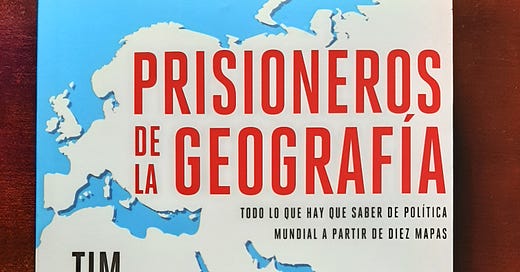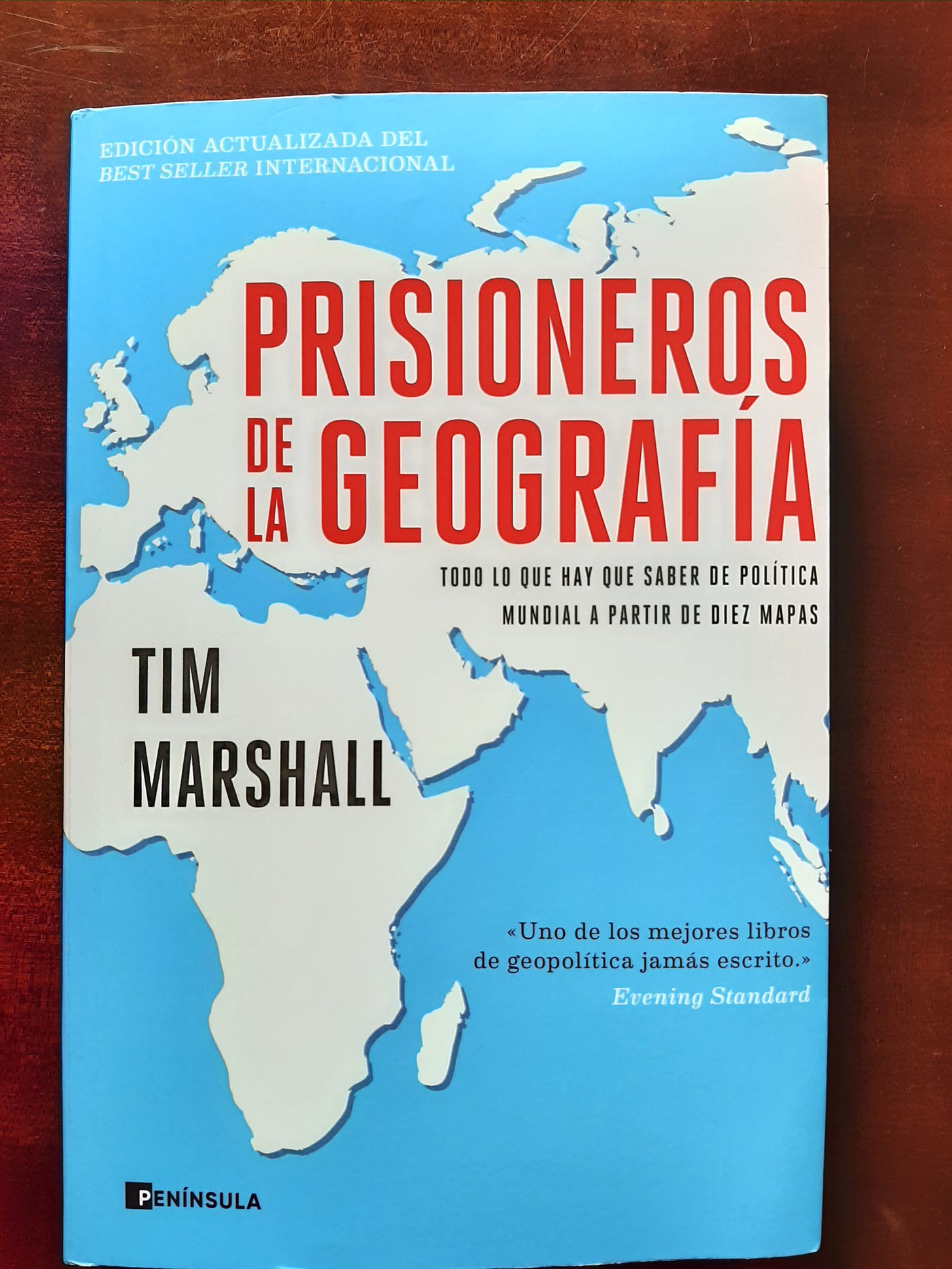57) Review de “Prisioneros de la Geografía” escrito por Tim Marshall.
Un libro interesante para quien este interesado en entender las corrientes de fondo que muchas veces nos arrastran en nuestro día a día. A través de los 10 mapas, el autor focaliza sobre diversas regiones, analizando como la geografía ha sido un factor condicionante de las relaciones entre grupos humanos en la historia, y por ende, entre diferentes países de la escena internacional.
Aunque el desarrollo de la tecnología ha reducido a su mínima expresión la importancia de la ubicación, el acceso a los recursos (alimenticios, hídricos, minerales, energéticos…) sigue siendo clave.
Parece evidente que con el avance del calentamiento global, en este siglo el agua se convertirá en la materia prima más codiciada, en este marco y por ilustrar con un ejemplo, el autor describe la problemática que enzarza a Egipto y Etiopia por la construcción de una presa al inicio del rio más largo de África, Nilo, denominada como Presa del Gran Renacimiento en territorio Etíope.
El fértil Nilo inferior dio origen a la antigua civilización egipcia y aún alberga las Grandes Pirámides cerca de El Cairo. Al igual que hemos visto a Putin emplear el gas natural como arma, el suministro de agua puede hacer temblar al 90% de los egipcios que viven cerca del Nilo, y ese poder lo ejercerá el Gobierno de Etiopia, pudiendo iniciar las “Guerras del agua”.
Otro ejemplo de la geopolítica del miedo, es la pugna de China e India por el Tíbet. Conocido como “El depósito de agua de China” al ser la fuente de 3 de los mayores ríos chinos (río amarillo, el Yangtsé y el Mekong), y con 2 países con más de 1400M habitantes cada uno, y un consumo de agua cada vez mayor, la pérdida del control de la zona resulta una amenaza casi existencial.
No obstante, el punto de mayor conflicto este siglo XXI será el Ártico, el cual siempre ha sido un lugar inhóspito, pero a medida que más y más terreno se hace accesible por el cambio climático, se irán descubriendo inmensas reservas de oro, zinc, níquel, hierro, gas natural, petróleo…Es por ello, que muchos analistas lo han denominado el Nuevo Gran Fuego.
Si aplicamos la visión que da la lectura del libro al “Triángulo de Litio” en Latinoamérica, zona limítrofe entre Argentina, Bolivia y Chile, donde se concentra el 65% de las reservas del Litio a nivel mundial, será un punto de posibles fricciones en el futuro. Si finalmente, la transición energética demanda el litio, solamente se me ocurren 2 vías que el tiempo nos resolverá.
-La formación entre los 3 países de algo similar a la OPEP para el petróleo.
-La aparición de algún líder con pretensiones expansionistas “amigo de lo ajeno”.
Que más apropiado que utilizar el propio final del libro “Aunque nos hayamos liberado de los grilletes de la gravedad, seguimos prisioneros de nuestras propias mentes, limitados por las sospechas que nos despiertan los ”otros”, de aquí nuestra primigenia competencia por los recursos, mucho camino por recorrer”.
57) Review of "Prisoners of Geography" written by Tim Marshall.
An interesting book for those who are interested in understanding the undercurrents that often drag us along in our day to day. Through the 10 maps, the author focuses on various regions, analyzing how geography has been a determining factor in the relationships between human groups in history, and therefore, between different countries on the international scene.
Although the development of technology has reduced the importance of location to a minimum, access to resources (food, water, minerals, energy...) continues to be key.
It seems evident that with the advance of global warming, in this century water will become the most coveted raw material, in this context and to illustrate with an example, the author describes the problems that engage Egypt and Ethiopia for the construction of a dam at the beginning of the longest river in Africa, Nile, called the Great Renaissance Dam in Ethiopian territory.
The fertile Lower Nile gave rise to the ancient Egyptian civilization and is still home to the Great Pyramids near Cairo. Just as we have seen Putin use natural gas as a weapon, the water supply can make 90% of Egyptians living near the Nile tremble, and that power will be exercised by the Ethiopian Government, being able to start the "Water Wars" ”.
Another example of the geopolitics of fear is the fight between China and India over Tibet. Known as "China's water reservoir" as it is the source of 3 of the largest Chinese rivers (Yellow River, Yangtze and Mekong), and with 2 countries with more than 1400M inhabitants each, and a water consumption each Increasingly, the loss of control of the area is an almost existential threat.
However, the hotspot of this 21st century will be the Arctic, which has always been an inhospitable place, but as more and more land becomes accessible due to climate change, immense reserves of gold, zinc, nickel, iron, natural gas, oil...That is why many analysts have called it the New Great Fire.
If we apply the vision given by reading the book to the "Lithium Triangle" in Latin America, a border area between Argentina, Bolivia and Chile, where 65% of the world's lithium reserves are concentrated, it will be a point of possible friction in the future. If finally, the energy transition demands lithium, I can only think of 2 ways that time will solve for us.
-The formation between the 3 countries of something similar to OPEC for oil.
-The appearance of some leader with expansionist pretensions "friend of the alien".
What more appropriate than using the very end of the book "Although we have freed ourselves from the shackles of gravity, we remain prisoners of our own minds, limited by the suspicions that the "others" arouse in us, hence our original competition for resources, a long way to go."






